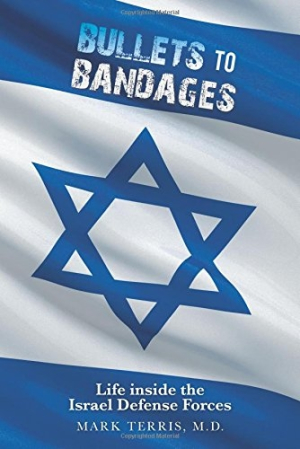Bullets to Bandages
Life Inside the Israel Defense Forces
Bullets to Bandages offers an intricate look inside one of the most battle-tested military forces in the world.
Mark Terris’s memoir, Bullets to Bandages: Life Inside the Israel Defense Forces, looks back at the American doctor’s three-year stint in the Israeli army during the late 1970s. While he could have instead chosen to go off to college in America to dodge the draft, he captures how he felt compelled to stay and serve the country that had protected his family during the Yom Kippur War.
Bullets to Bandages offers a look inside one of the most battle-tested military forces in the world. The book follows four Israeli soldiers as they survive their 1,095 days in the army, enduring guard duty in the middle of the night, long runs, hail-soaked marches, huge blisters, endless bouts of boot polishing, and the anxiety of inspections.
The coming-of-age account shines light on what life is like inside the IDF, detailing all of the physical hardships and challenges, from paratrooper training to combat medic school, and recalling intimate moments such as the first time Terris witnessed childbirth. It chronicles the maturation of new recruits who become serial numbers and eventually commanders who led and perpetuated the traditions of the Israeli military.
The memoir is impressively detailed, matter-of-factly describing autopsies, administering IVs, emergency room uncertainty, and the sudden, disorienting shock of grenade explosions.
Steering clear of the romanticization and self-aggrandizement that military memoirs sometimes fall prone to, Bullets to Bandages offers a realistic, accurate look at army life. Soldiers mock how they have to perform guard duty with brooms during basic training, joking about whether the enemy would attack with sand they could sweep away. The book can often be funny, such as when the narrator quips that blankets are not for sleeping during basic training, or how an indoctrinating lecture after lunch about how to be good Zionists was “not a bad hour” because it presented an opportunity to catch up on lost sleep.
The book captures well how the young soldiers joke with one another, relating many witty and cynical exchanges that lighten a difficult experience. The characters, whose names were changed to preserve their anonymity, feel eminently relatable as they commiserate over stretcher marches, injuries, bad food and the various indignities of military service. The relationships between the young soldiers, who provide each other with succor and support, drive the book forward and give it emotional heft.
Bullets to Bandages stands as a compelling account of courage, camaraderie, toughness, and perseverance, giving a glimpse of everyday military life in Israel.
Reviewed by
Joseph S. Pete
Disclosure: This article is not an endorsement, but a review. The publisher of this book provided free copies of the book and paid a small fee to have their book reviewed by a professional reviewer. Foreword Reviews and Clarion Reviews make no guarantee that the publisher will receive a positive review. Foreword Magazine, Inc. is disclosing this in accordance with the Federal Trade Commission’s 16 CFR, Part 255.

